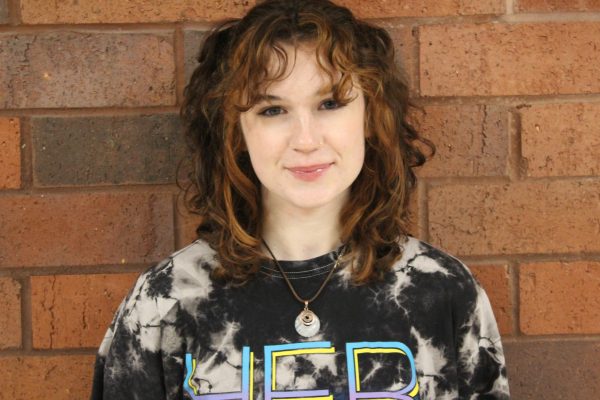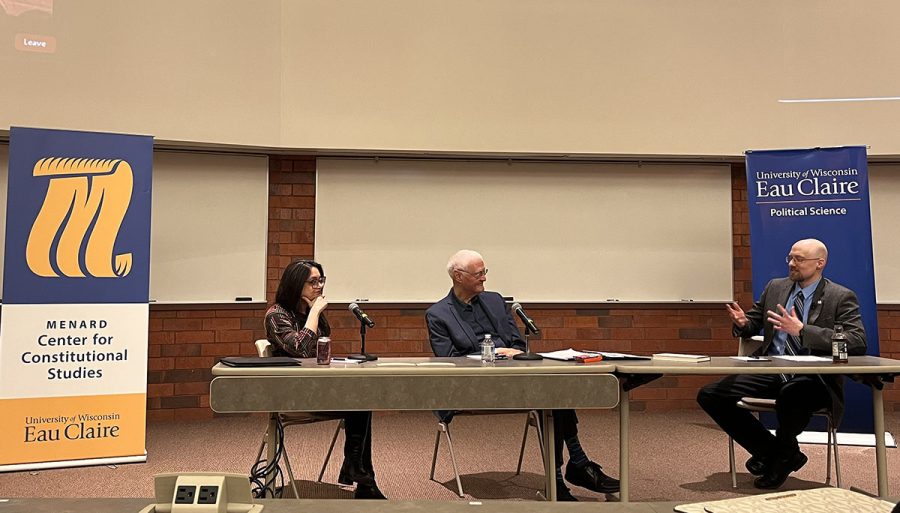Menard Center hosts free speech panel
Panel speakers discuss the future of free speech on college campuses
Photo by Charlotte Becker
Amna Khalid, Donald Downs and Eric Kasper at the panel on May 1.
On Monday, May 1 in Hibbard Humanities Hall, the Menard Center for Constitutional Studies hosted a panel discussion regarding the future of free speech on college campuses.
The Menard Center aims to educate and conduct outreach pertaining to constitutional matters, according to the organization’s webpage.
“The mission of the non-partisan Menard Center for Constitutional Studies is to promote research, education and community outreach on matters related to the United States Constitution and the Wisconsin Constitution,” the webpage says.
The discussion by the panel was focused on free speech specifically on college campuses from the viewpoints of college faculty and those educated in free speech and political science.
The panel consisted of three speakers — Amna Khalid, associate professor at Carleton College, Greg Lukianoff, president and CEO of the FIRE organization, and Donald Downs, professor emeritus at UW-Madison.
The panel was mediated by Menard Center Director Eric Kasper.
The conversations were regarding the future and current free speech abilities of those in universities, according to Khalid.
“It is about the nature of discourse on college campuses and how the space for conversation is being narrowed,” Khalid said. “Perhaps also some discussion of why and what we can do about it.”
According to Khalid, who is originally from Pakistan, she grew up and went to college in Pakistan under a series of military dictatorships and as a result knows about restraints on speech and the effects that those restraints pose.
“I am well aware of what the nature of an institution comes to be when free expression is constrained, ” Khalid said. “My concern is that the people who lose out are the students. They get a substandard education when controversial subjects can not be discussed.”
Academic freedom and the freedom of speech are essential to American universities, according to Khalid.
“I moved across the world to be able to teach at a school that has the premise of academic freedom,” Khalid said. “One of the reasons that U.S. universities are the envy of the world is because they have upheld academic freedom. It is disappointing to find that that is at stake.”
The future of the freedom of expression and academia is uncertain, according to Khalid, and including students in creating an academically free campus is extremely important.
“My hope is that through conversations like the one today we will be able to underscore the importance of creating a culture of free expression on campus,” Khalid said. “We need to cultivate that ourselves and students are a part of that.”
Colleen Marchwick, Director in the Center for International Education and panel audience member, left the event with a sense of responsibility regarding speech and expression.
“We have to be mindful of free speech if we want to retain it, ” Marchwick said. “What I took away was that we have a responsibility to self manage and not react in anger right away but to reflect and listen before we respond.”
Attending events like the May 1 panel is very important and unique to college campuses, according to Marchwick.
“We have the opportunity to hear wonderful speakers with diverse viewpoints,” Marchwick said. “I think sometimes we take it for granted. Outside of the university you just don’t have those opportunities.”
Becker can be reached at [email protected].

Charlotte Becker is a second-year social studies education student and this is her third semester on staff. She loves taking photos in her free time, as well as reading and thrifting.











